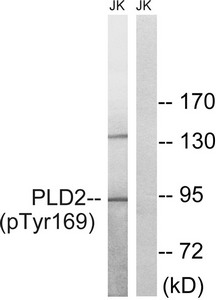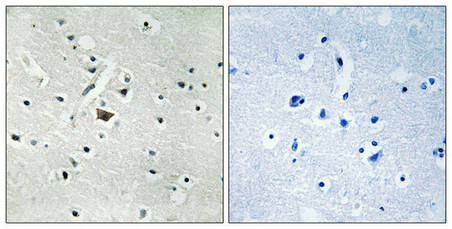Phospho-PLD2 (Tyr169) Antibody
-
货号:CSB-PA983138
-
规格:¥2454
-
图片:
-
Western blot analysis of extracts from Jurkat cells treated with TNF using PLD2 (Phospho-Tyr169) Antibody.The lane on the right is treated with the antigen-specific peptide.
-
Immunohistochemical analysis of paraffin-embedded human brain tissue using PLD2 (Phospho-Tyr169) antibody (left)or the same antibody preincubated with blocking peptide (right).
-
-
其他:
产品详情
-
产品名称:Rabbit anti-Homo sapiens (Human) PLD2 Polyclonal antibody
-
Uniprot No.:O14939
-
基因名:
-
宿主:Rabbit
-
反应种属:Human,Mouse,Rat
-
免疫原:Peptide sequence around phosphorylation site of tyrosine 169(E-N-Y(p)-L-N) derived from Human PLD2.
-
免疫原种属:Homo sapiens (Human)
-
克隆类型:Polyclonal
-
纯化方式:Antibodies were produced by immunizing rabbits with synthetic phosphopeptide and KLH conjugates. Antibodies were purified by affinity-chromatography using epitope-specific phosphopeptide. Non-phospho specific antibodies were removed by chromatogramphy usi
-
浓度:It differs from different batches. Please contact us to confirm it.
-
产品提供形式:Liquid
-
应用范围:ELISA,WB,IHC
-
推荐稀释比:
Application Recommended Dilution WB 1:500-1:1000 IHC 1:50-1:100 -
Protocols:
-
储存条件:Upon receipt, store at -20°C or -80°C. Avoid repeated freeze.
-
货期:Basically, we can dispatch the products out in 1-3 working days after receiving your orders. Delivery time maybe differs from different purchasing way or location, please kindly consult your local distributors for specific delivery time.
相关产品
靶点详情
-
功能:Function as phospholipase selective for phosphatidylcholine. May have a role in signal-induced cytoskeletal regulation and/or endocytosis.
-
基因功能参考文献:
- Data show that phospholipase D2 (PLD2)-produced phosphatidic acid (PA) promoted cell invasion through the the expression of angiogenin (ANG) in clear cell renal cell carcinoma (ccRCC) cells. PMID: 29660846
- AQP3 siRNA and PLD2 siRNA significantly downregulated the mRNA and protein levels of AQP3 and PLD2 in the A431 cells; inhibiting proliferation and promoting apoptosis in vitro. PMID: 28656282
- PLD2 is involved into pathogenesis of a vast array of human diseases, and as such it can be targeted for therapy. (Review) PMID: 26695710
- Slug is a positive regulator, and Snail a negative regulator, of PLD2 expression. PMID: 26781944
- Data suggest that elevated membrane tension acts through phospholipase D2 (PLD2) and the mammalian target of rapamycin complex 2 (mTORC2) to limit actin nucleation. PMID: 27280401
- results suggest that the small GTPase RalA plays an important role in promoting invagination and trafficking of caveolae, not by potentiating the association between Cav-1 and FilA but by stimulating PLD2-mediated generation of phosphatidic acid. PMID: 27510034
- PLD2 functions as a key mediator in the VEGF-mediated angiogenic functions of endothelial cells. PMID: 26818087
- PLD2 protein itself interacts with HIF-1alpha, prolyl hydroxylase (PHD) and VHL to promote degradation of HIF-1alpha via the proteasomal pathway independent of lipase activity. PMID: 26611735
- PLD2-mediated production of phosphatidic acid contributed to the control of EGFR exposure to ligand through a multipronged transcriptional and posttranscriptional program during the out-of-control accumulation of EGFR signaling in cancer cells. PMID: 26124282
- These results suggest that PLD2 expression in colon cancer cells is up-regulated via HIF1-alpha in response to hypoxic stress and underscores the crucial role of HIF1-alpha-induced PLD2 in tumor growth. PMID: 25432699
- A 3D model of the PLD2 by combining homology and ab initio 3 dimensional structural modeling methods, and docking conformation, is reported. PMID: 25308783
- PLD2 expression regulates formation of Golgi tubules in Hela cells. PMID: 25354038
- Phospholipase D is involved in the formation of Golgi associated clathrin coated vesicles in human parotid duct cells PMID: 24618697
- PLD2, but not PLD1, directly binds to the C terminus of TREK1 and TREK2. PMID: 25197053
- Knockdown of PLD2 induces autophagy in colorectal cancer cells. PMID: 25475140
- Inhibition of PLD2 accelerated the accumulation of MxA in foci as early as 30 min postinfection. .. PLD facilitates the rapid endocytosis of influenza virus, permitting viral escape from innate immune detection PMID: 25065577
- Out of these myriads of functions, PLD is becoming recognized as a major player in cell migration, cell invasion, and cancer metastasis. PMID: 24990944
- PLD1 and PLD2 mutants inhibit very-low-density lipoprotein-induced aldosterone production in HAC15 cells. PMID: 24956203
- PLD2 downregulation causes senescence through the p53-p21(Cip1/WAF1) pathway by stimulating ROS production, which is induced by CK2 inhibition PMID: 25064843
- Syntenin-ALIX exosome biogenesis and budding into multivesicular bodies are controlled by ARF6 and PLD2. PMID: 24637612
- Demonstrate a novel role for endothelial PLD2 in the survival and migration of ECs under hypoxia via the expression of hypoxia-inducible factor-1alpha and in pathological retinal angiogenesis and tumor angiogenesis in vivo. PMID: 24947526
- the present study demonstrated the clinical significance of miR-203 in gliomas and suggested that miR-203 was able to inhibit the proliferation and invasion of glioma cells, partially at least via suppressing the protein expression of PLD2. PMID: 24270883
- Inhibition of PLD2 ameliorated ABETA-induced reduction of soluble amyloid precursor protein alpha secretion. PMID: 24650665
- Data indicate that phospholipase D2 (PLD2) promotes autophagy through regulation of Akt in glioblastoma cells. PMID: 24257753
- the non-synonymous Single-Nucleotide Polymorphisms (nsSNPs) of PLD2 gene and its variations in different populations to understand its role in hypertension. PMID: 23649737
- Findings indicate that phosphatidic acid (PA) production by PLD2 determines the output of ERK1/2 in cancer cell growth factor signaling. PMID: 24164897
- PLD2 has a central role in the development, metastasis and level of aggressiveness of breast cancer PMID: 23752189
- analysis of the JAK-Fes-phospholipase D signaling pathway that is enhanced in highly proliferative breast cancer cells PMID: 23404507
- Data indicate that the invasive phenotype of MDA-MB-231 cells is mediated by phospholipase D2 (PLD2) under direct regulation of both Janus kinase 3 (JAK3) and tepidermal growth factor receptor (EGFR). PMID: 23238254
- how PLD2 participates in cell differentiation PMID: 22094461
- The rhPLD2 may suppress the chronic inflammatory reaction through down-regulating PKC expression and STAT1/STAT5a activity in the lung. The rhPLD2 may be a suitable therapeutic target for asthma. PMID: 21854185
- the C-terminal domain of PLD2 can regulate Casein Kinase II by accelerating Casein Kinase II beta degradation. PMID: 21944249
- The PX domain of PLD2 mediates the interaction and has a GEF-like activity for RhoA, which contributes to stress fiber formation. PMID: 21440060
- A high level of cell invasiveness of cancer cells can be explained for the first time by combined high JAK3/PLD2 phosphorylation and activity involving PLD2's Y415 residue, which might constitute a novel target to inhibit cancer cell invasion. PMID: 21414324
- CHDH and PLD2 as novel candidate genes, the nucleotide variants of which could be associated with the risk of tooth agenesis. PMID: 21308979
- activated cells PLD2 affects Rac2 in an initial positive feedback, but as Rac2-GTP accumulates in the cell, this constitutes a "termination signal" leading to PLD2 inactivation. PMID: 21378159
- REVIEW: aquaporin 3's role and interaction with phospholipase D2 PMID: 21276418
- The results of this study pointed to PLD2 as key modulators of Alzheimer's disease pathogenesis. PMID: 21147981
- Thr566 of PLD2 is directly phosphorylated by PKCdelta, and PLD2 mutation in this region prevents PLD2 activation, PLD2 translocation to the edge of lamellipodia, Rac translocation, and cell spreading after integrin activation PMID: 20733000
- Data suggest that highly mobile cells like macrophages use all signaling machinery available to them in phospholipase D2-induced chemotaxis, which sets them apart from fibroblasts, cells normally nonmobile that rarely become migratory. PMID: 20647543
- IL-8 reverses an mTOR/S6K-led down-regulation of PLD2 expression and enables PLD2 to fully function as a facilitator for cell migration PMID: 20410302
- Platelet-derived growth factor PLD2 expression via NFkappaB does not enhance the invasiveness of breast cancer cells. PMID: 20188462
- PLD2 activity is low in the breast cancer cell line MCF-7 because it is kept downregulated by tyrosyl phosphorylation of Y(296) by EGFR kinase. PMID: 20176813
- Epidermal growth factor stimulation lysophosphatidi acid production in human ovarian cancer in a manner that requires PLD2. PMID: 19864325
- localizes to the plasma membrane of mast cells; stimulated by oleic acid PMID: 12374567
- PLD2 activity is directly regulated by ADP-ribosylation factor 4, and this ARF4-mediated PLD2 activation stimulates AP-1-dependent transcription in the EGF-induced cellular response PMID: 12446727
- PLD is regulated py phosphoinositides through the PH domain and the polybasic motif PMID: 12486109
- PLD2 may play a key role in the regulation of agonist-induced endocytosis of the mu-opioid receptor PMID: 12519790
- Phospholipase D(2) gene is a susceptibility locus for colorectal cancer in Japanese individuals. PMID: 12601529
- phospholipase D2 was enriched in caveolae; PLD2 could be involved in MEK/ERK signaling cascades that are induced by the VEGF/VEGFR-2/PKC-delta pathway in endothelial cells PMID: 14704231
显示更多
收起更多
-
亚细胞定位:Cell membrane; Lipid-anchor.
-
蛋白家族:Phospholipase D family
-
组织特异性:Ubiquitous.
-
数据库链接:
HGNC: 9068
OMIM: 602384
KEGG: hsa:5338
STRING: 9606.ENSP00000263088
UniGene: Hs.104519
Most popular with customers
-
-
YWHAB Recombinant Monoclonal Antibody
Applications: ELISA, WB, IF, FC
Species Reactivity: Human, Mouse, Rat
-
Phospho-YAP1 (S127) Recombinant Monoclonal Antibody
Applications: ELISA, WB, IHC
Species Reactivity: Human
-
-
-
-
-






















